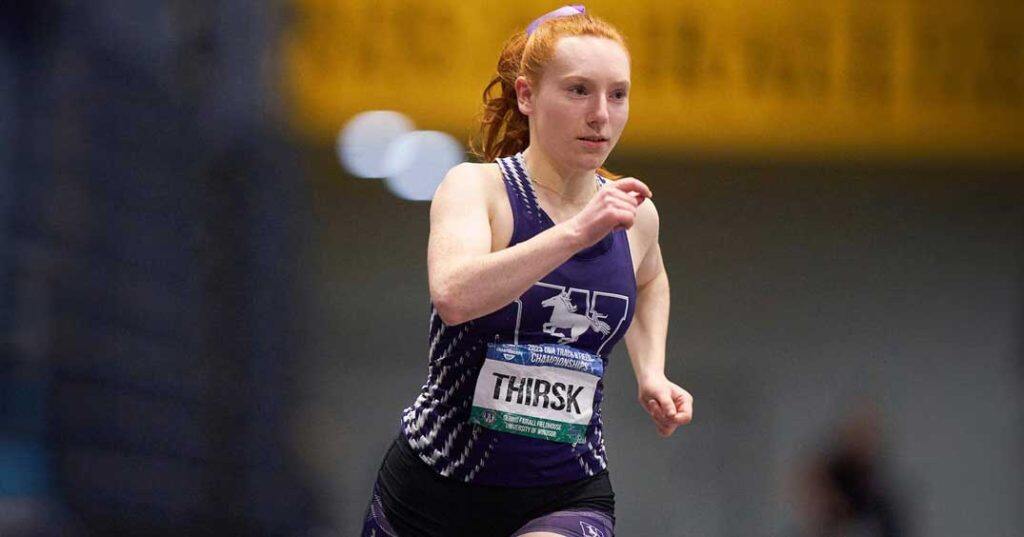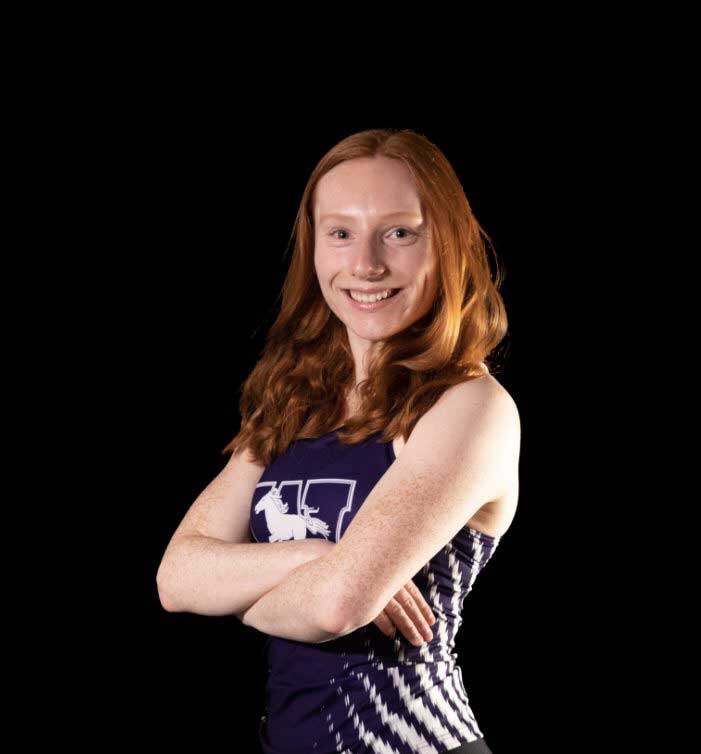

(Kosuke Media photo)
In September 2022, Natalie Thirsk set herself a goal: to make it on the Canadian national team for the World Para Athletics Championships. On July 8, when the national team begins its participation in the championships hosted by Paris, France, she will be present as a member.
The sprinter’s story is one of single-minded focus. She is currently a third-year nursing student at the Faculty of Health Sciences and a 100-metre and 400-metre sprinter for the Western Mustangs track and field team.
Thirsk, whose name was announced for the Canadian team on June 29, will be competing in the T38 100-metre and 400-metre races in Paris. The T38 classification is used for athletes with cerebral palsy, a group of disorders that can affect movement and muscle tone or posture. For Thirsk, it means she battles muscle spasticity and tightness in her arms and legs.
As a child, Thirsk recalled, she was the slowest runner in class and avoided running at all costs. Instead, she played ringette, in which her performance was not affected as much as in track and field sports.


In 2019, after participating in a para event at the University of Alberta, Thirsk started training as a para athlete and decided to give track and field a try. Using her experience in other sports, she found success in para-athletics, breaking multiple Canadian records in the T38 100 metres, 200 metres and 400 metres during her first few years.
However, she pointed out some of the challenges with the track stopwatch, which acts like a hidden barrier for all people with disabilities because it does not accommodate for the disability. “People see me finishing last in a race but what they don’t see are the Canadian records I’m setting or how I rank (among the) top eight in the world. The clock only shows my disability, not my athleticism and accomplishments,” Thirsk said.
Thirsk is a second-generation student athlete, and she acknowledged her father, Warren Thirsk, a former wrestler for the Western Mustangs and U SPORTS Champion in 1991, who has been pivotal in helping her develop her perseverance, grit and determination. These are skills that have served Thirsk well throughout her sporting career, as she has learned to see the bigger picture, and to continue to push herself to set personal bests.
Thirsk joined the Western Mustangs track and field team in the fall of 2020. She expressed her gratitude to head coach Vickie Croley and her teammates, for welcoming her with open arms and supporting her as she became one of the first para-athletes competing at U SPORTS.
“Without my teammates and coaches, I would not be where I am today and I am grateful for the opportunity to acknowledge their impact on my successes,” she said.
Thirsk also emphasized the role of Mustangs assistant coach, Taylor Ehrhardt for his support in adapting running and lifting techniques for her, as well as training plans, to help accommodate the impact of her cerebral palsy. She has been working very hard with Ehrhardt, a nine-time member of the Canadian national team.
Ehrhardt is proud and happy to see Thirsk selected to the Canadian team. “She set a goal at the start of the year of making it to Paris and she did everything in her power to make that happen.”
Ehrhardt, a three-time national champion in the long jump and decathlon, explained what Thirsk can expect to encounter during the games in July.
“Natalie is a very regimented individual, which is great for a sport like track and field due to its repetitive nature. I personally was a bit more go with the flow, so I am able to try and guide her (to anticipate what to do if) something doesn’t go as planned.” – Taylor Ehrhardt, assistant coach, Western Mustangs track and field team
He also applauded Athletics Canada for their support and dedication towards their para-athletes, and said he held high hopes, when asked about the talent and experience in this year’s Canadian team.
“I am excited to see how everyone performs because right now a lot of Canadian records are falling from (the athletes on) this team and it would be amazing to see Canada come away with more than their projected medal total,” said Ehrhardt.
Thirsk’s goals for the upcoming meet are to push herself to run personal bests, and to finish in the top eight. These milestones are in line with her greater goals of competing in the 2024 Paralympics, also in Paris. Given the timing of these international events, Thirsk is grateful for the cooperation and support from her faculty and her academic counsellor, Denice Litzan.



































